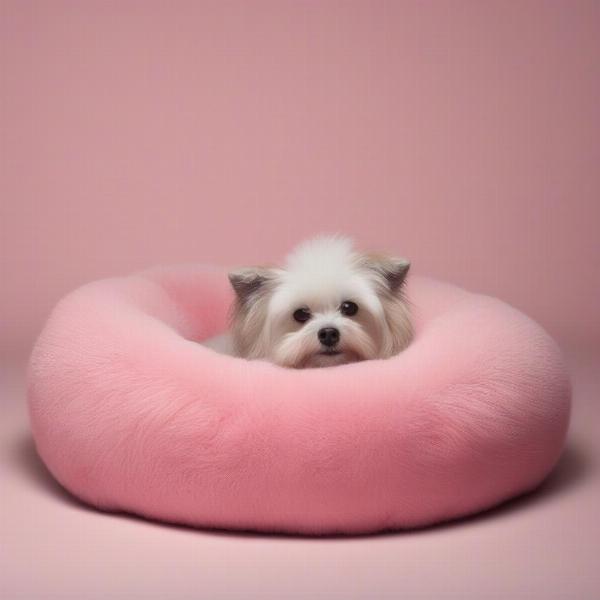Donuts for dogs have become increasingly popular, sparking curiosity and questions among pet owners. Are they a safe and beneficial addition to a dog’s routine, or simply a passing fad? This comprehensive guide will delve into the world of donut-shaped products for dogs, exploring their various forms, benefits, and potential drawbacks. We’ll cover everything from donut beds and collars to the question of whether dogs can safely consume human donuts.
 Dog Enjoying a Donut Bed
Dog Enjoying a Donut Bed
Understanding the “Donut for Dogs” Trend
The term “donut for dogs” encompasses a variety of products designed with a circular, donut-like shape. These products cater to different needs, from comfort and recovery to training and behavior modification. The most common types include:
- Donut Beds: These plush, round beds provide a sense of security and comfort, particularly for dogs who enjoy curling up or burrowing.
- Donut Collars: Often used after surgery or injury, donut collars prevent dogs from licking or biting affected areas, promoting healing.
- Donut Toys: These toys come in various materials and sizes, offering entertainment and mental stimulation.
Can Dogs Eat Human Donuts?
While the image of a dog enjoying a sugary donut may seem amusing, it’s crucial to understand that human donuts are not suitable for canine consumption. The high sugar content, along with other ingredients like chocolate and artificial sweeteners, can be toxic to dogs. Even small amounts can lead to digestive upset, obesity, and more serious health issues.
The Benefits of Donut-Shaped Products for Dogs
Donut beds, in particular, offer several benefits:
- Comfort and Security: The raised edges of donut beds provide a sense of security and allow dogs to rest their heads, promoting relaxation and better sleep.
- Joint Support: The soft filling can help alleviate pressure on joints, making them ideal for senior dogs or those with arthritis.
- Anxiety Relief: The enclosed shape can help reduce anxiety in dogs who feel more secure in confined spaces.
Donut collars, also known as Elizabethan collars, are essential for post-surgical recovery or injury management, preventing self-inflicted trauma and promoting healing.
Choosing the Right Donut for Your Dog
When selecting a donut bed, consider your dog’s size, breed, and sleeping habits. Ensure the bed is large enough for your dog to stretch out comfortably. For donut collars, proper fitting is crucial to prevent discomfort and ensure effectiveness. Consult your veterinarian for guidance on the appropriate size and type of collar for your dog’s specific needs.
Are Donut Beds Suitable for All Dogs?
While donut beds offer numerous advantages, they may not be the best choice for every dog. Dogs who overheat easily might find the enclosed shape too warm. Puppies or dogs prone to chewing might damage the bed. It’s important to observe your dog’s behavior and adjust accordingly.
Conclusion
Donut-shaped products can be a valuable addition to a dog’s life, providing comfort, support, and promoting healing. However, it’s crucial to differentiate between beneficial donut-shaped products like beds and collars and the harmful effects of actual donuts intended for human consumption. By understanding the various options available and choosing wisely, you can enhance your dog’s well-being and provide them with the comfort and care they deserve. Remember to always consult with your veterinarian if you have any concerns about your dog’s health or the suitability of specific products.
FAQ
- Are donut beds good for anxious dogs? Yes, the enclosed shape can provide a sense of security and help reduce anxiety in some dogs.
- What size donut bed should I buy for my dog? Measure your dog’s length and choose a bed that allows them to stretch out comfortably.
- Can I wash a donut bed? Most donut beds are machine washable, but always check the manufacturer’s instructions.
- How long should a dog wear a donut collar? This depends on the injury or surgical procedure. Your veterinarian will advise on the appropriate duration.
- Are donut collars comfortable for dogs? While they might feel unusual at first, donut collars are generally well-tolerated and prioritize healing.
- What are the alternatives to donut collars? Some alternatives include soft cones or inflatable collars. Discuss options with your vet.
- Can my dog sleep in a donut bed with a donut collar? Yes, as long as the collar doesn’t prevent the dog from comfortably entering and exiting the bed.
ILM Dog is a leading online resource dedicated to providing expert advice and information on all aspects of dog care, from breed selection and health to training, nutrition, grooming, and product recommendations. We strive to empower dog owners with the knowledge and resources they need to provide their canine companions with the best possible care. For further assistance or personalized advice, please don’t hesitate to contact our team of experts at [email protected] or call us at +44 20-3965-8624. ILM Dog offers a wide range of resources to help you make informed decisions about your dog’s health, wellbeing, and happiness.